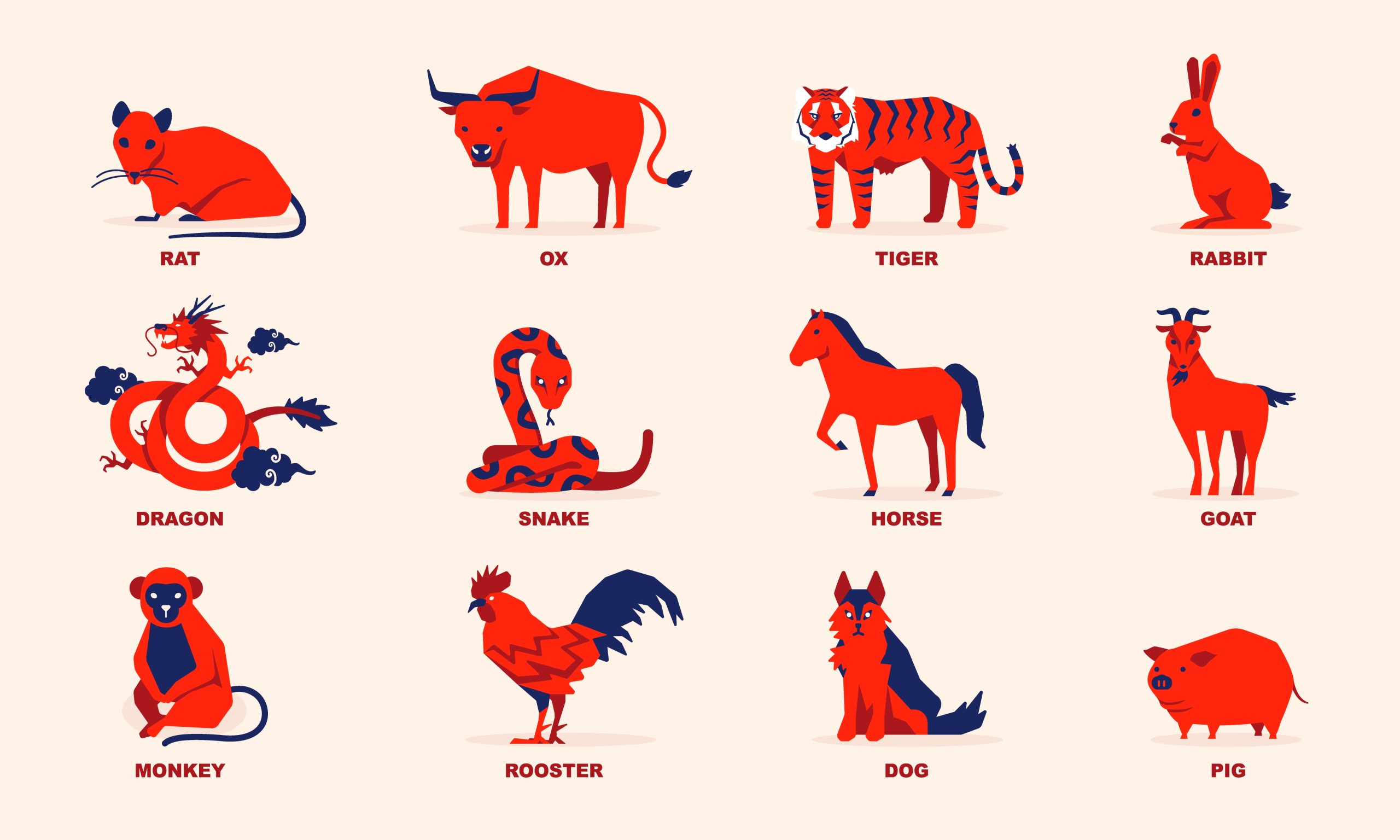The role of feng shui colors is vital in this ancient Chinese practice. Color is a key element used to change a space’s energy. It greatly affects our feelings and well-being.
Different feng shui color systems, like the five elements, bring unique energies. Knowing the meanings and uses of these colors can help make our homes more harmonious. It also improves the flow of life’s energy.
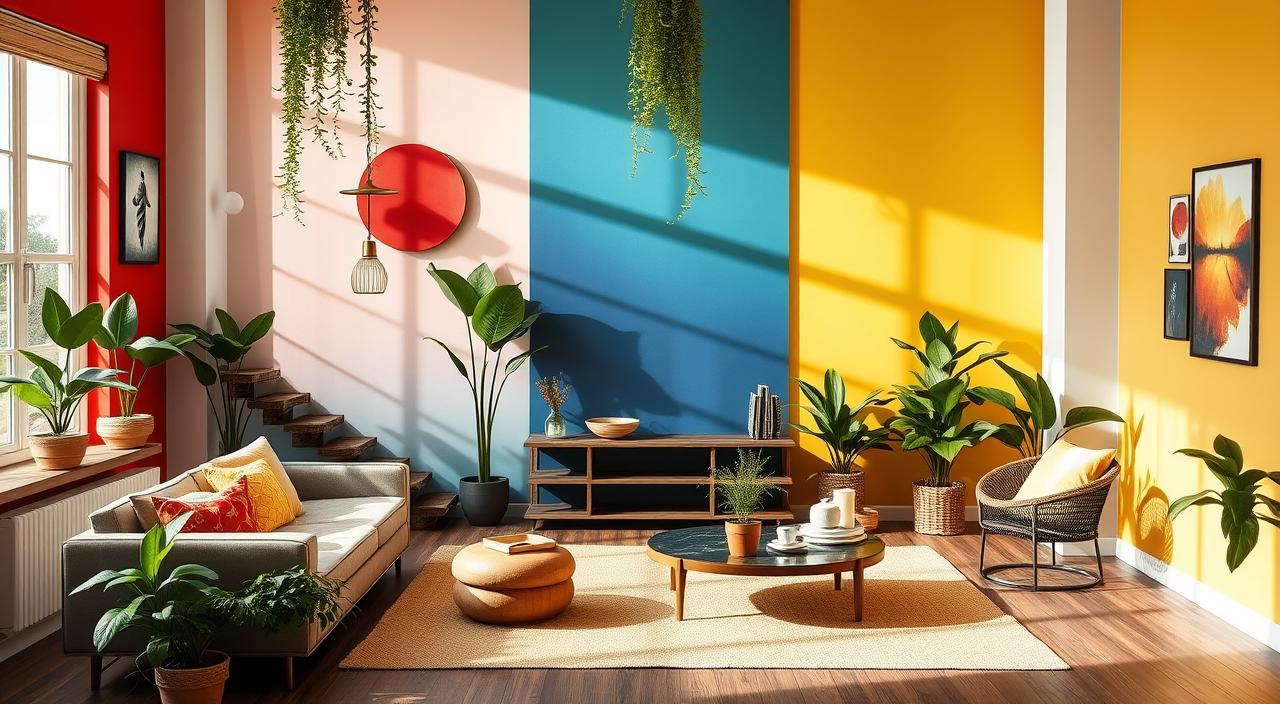
Key Takeaways
- Color is a key part of the ancient Chinese practice of feng shui, helping to change a space’s energy.
- Different feng shui color systems, like the five elements, bring unique energies that affect our feelings and well-being.
- Understanding the meaning and use of various best colors for feng shui can help homeowners create harmonious living spaces.
- Using the right feng shui colors can improve the flow of energy and balance in life.
- Homeowners should think about their personal preferences and the specific area of the home when choosing feng shui colors.
Introduction to Feng Shui Colors
Color is key in feng shui, as it affects the energy in your space. The right colors can change how you feel and find balance. Knowing how color works in feng shui is vital for your home.
The Significance of Color in Feng Shui
In feng shui, colors have special energies. They can either help or block the energy flow in your space. Choosing the right colors can make your home a place of harmony and happiness.
The Five Elements and Their Associated Colors
- The five elements of feng shui – wood, fire, earth, metal, and water – have specific colors. These colors help balance and boost their energies.
- It’s important to know these colors to apply feng shui in your home.
Using the right feng shui colors can help achieve your life goals. Whether it’s for your career, relationships, or well-being, color is a powerful tool.
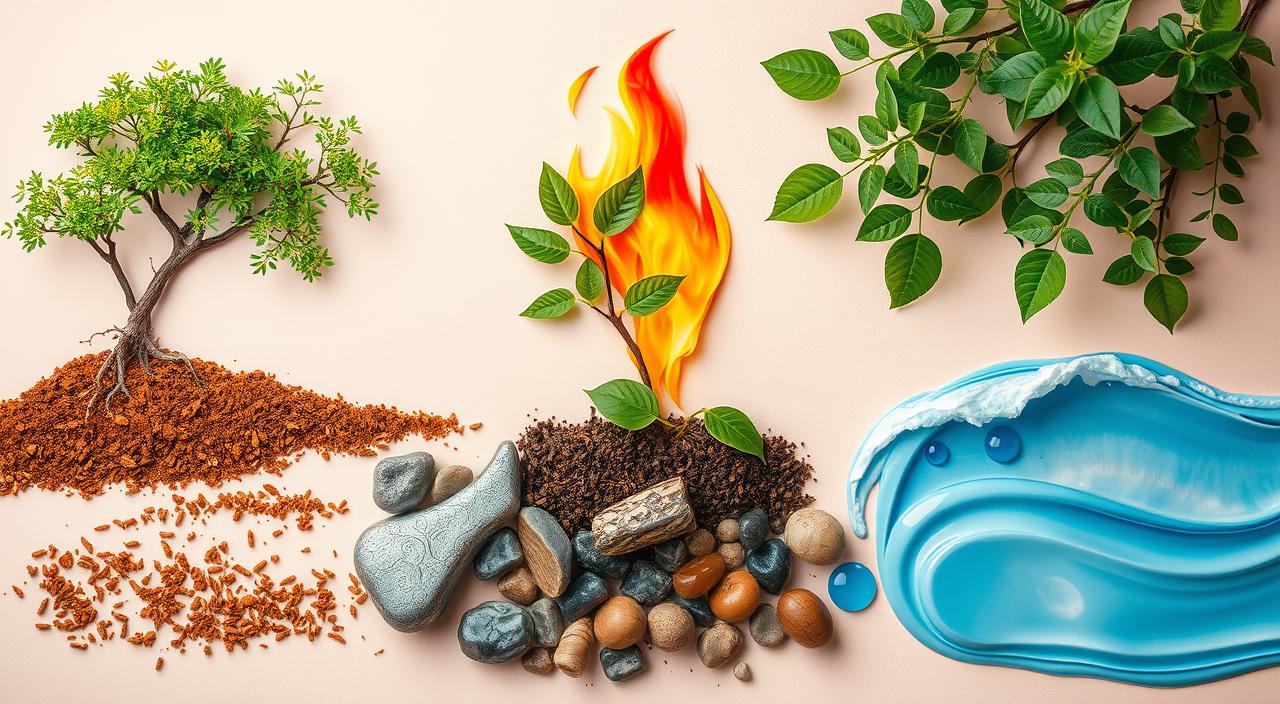
The Meaning of White in Feng Shui
In the ancient Chinese art of feng shui, white is very meaningful. It’s linked to the metal element. White stands for clear thinking, being productive, creative, good at talking, and finishing things.
White is like a blank page, showing the yang side of the yin-yang symbol. It’s a clean and pure color. It helps make other colors in the home work well together, creating harmony.
White is also good for areas in the home meant for kids. It helps in nurturing and growing creativity. Using white in these areas can improve family life and personal growth.
“White is the color that has the most distance and the most emptiness. It represents clarity, simplicity, and perfection.”
White can change a space a lot, whether it’s the main color or just an accent. Knowing what white means in feng shui helps people choose the right colors for their homes and workspaces.
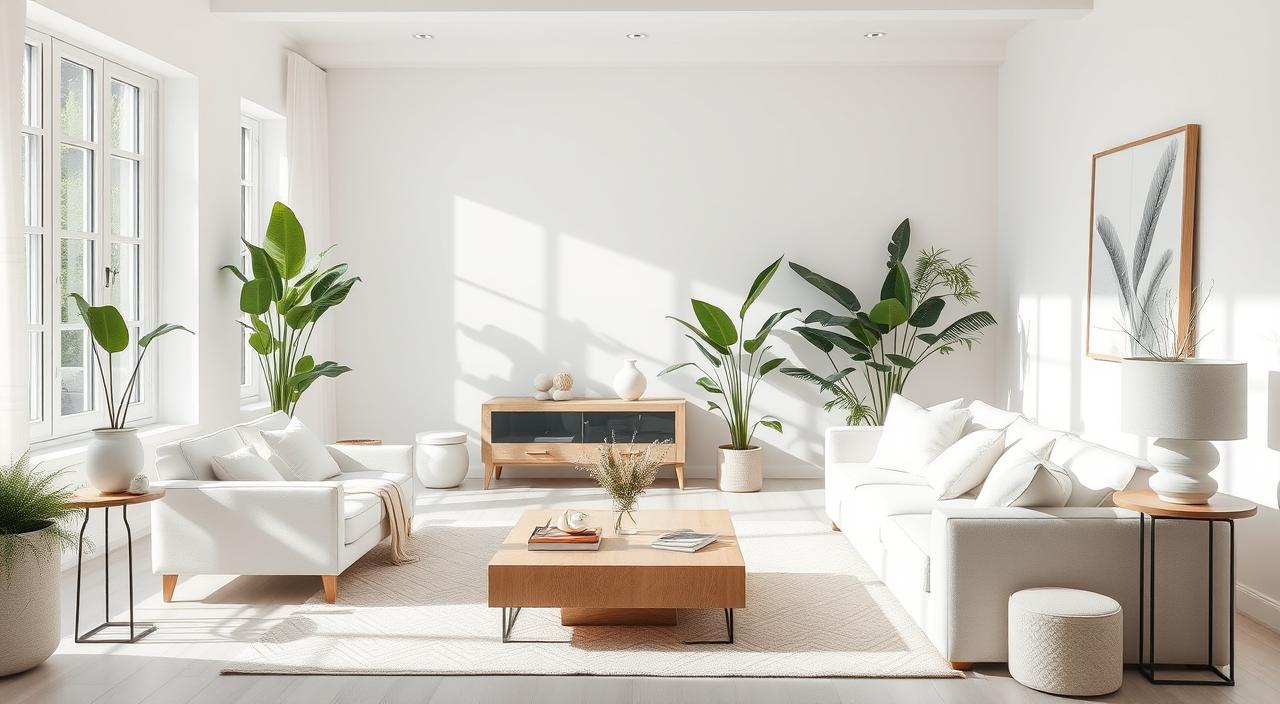
The Meaning of Black in Feng Shui
In the ancient practice of feng shui, black is very important. It is the sum of all colors, showing the yin side of the yin-yang symbol. It’s linked to the water element, which means calmness, wisdom, and quiet thought.
Black is a strong color in feng shui, tied to the Career area of the bagua map. While black might seem dark in other cultures, in feng shui, it means depth and exploring oneself. It can add timeless elegance and sophistication to a home when used as an accent color.
Black and the Water Element
The water element, shown by black, is key for a successful career and growth. Using black accents, like in furniture or decor, can bring focus and clarity to workspaces. It encourages quiet thought, helping us find our inner wisdom.
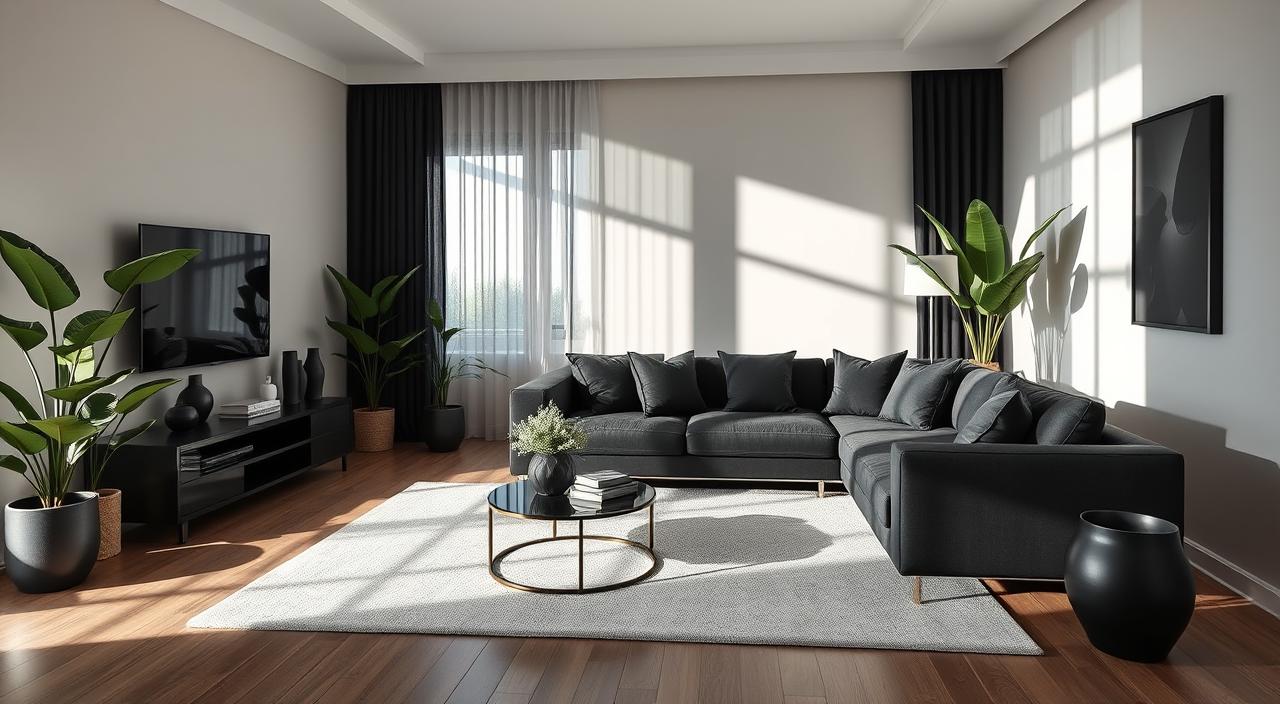
“In feng shui, black represents the water element, which is associated with calmness, wisdom, and quiet contemplation. Black is a powerful color that can bring elegance and sophistication to the home.”
The Versatility of Gray in Feng Shui
In the world of feng shui, gray is a versatile and often overlooked color. It’s a mix of black and white, symbolizing clarity, connection, and wisdom. This neutral hue fits well in most home settings, making it a favorite among feng shui fans.
Gray’s flexibility comes from its ability to work in both dark and light shades. Darker grays can add stability, while lighter grays bring an airy feel. This versatility lets homeowners use gray to enhance or complement different areas of their home.
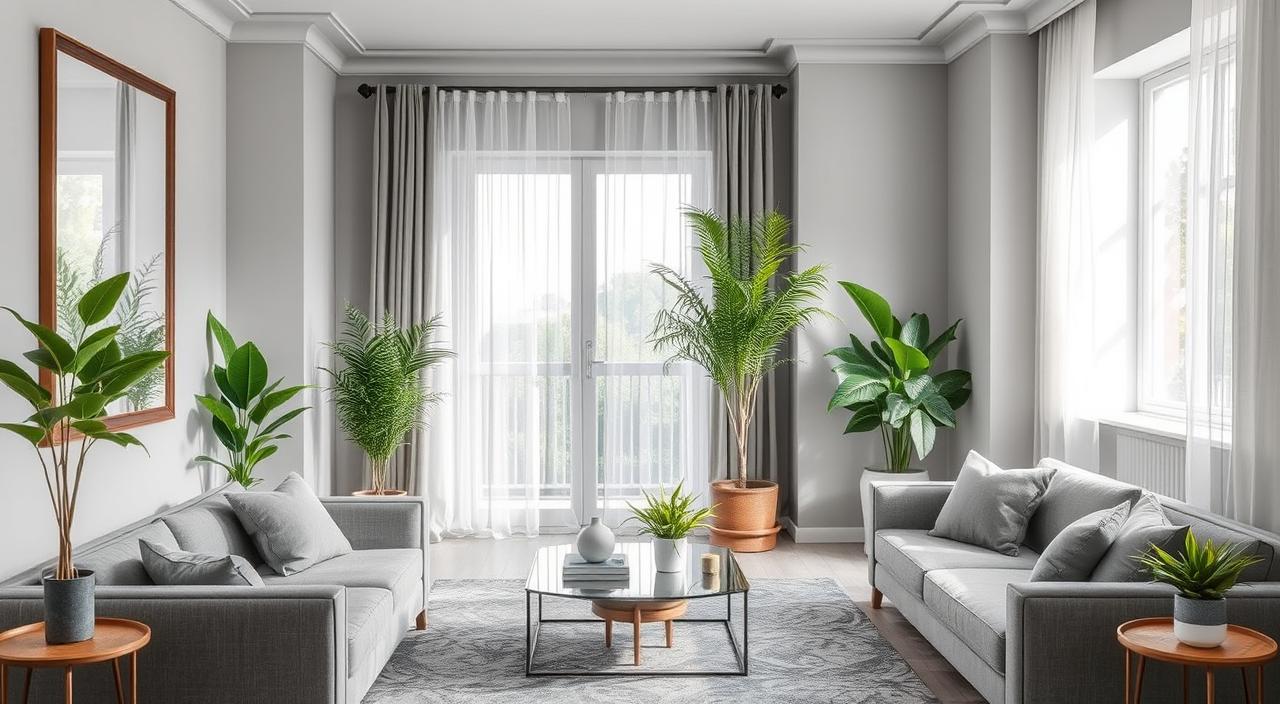
Interestingly, gray is considered a lucky color in feng shui, mainly for those who travel a lot. The Qian area of the bagua map, linked to travel and helpful people, is connected to gray’s energy. Adding gray accents or furniture to these areas can attract good fortune.
Whether you want a cozy or airy atmosphere, gray feng shui is a great choice. Let this underrated color bring balance, clarity, and luck to your home.
Feng Shui Color Meanings, Best Colors for Feng Shui
In the world of feng shui, blue is very special. It’s linked to growth, vitality, and compassion. Each blue shade has its own energy and meaning.
The feng shui blue color range includes many tones. Mid-tone blues and teals help us feel calm and nurturing. They’re great for bedrooms and bathrooms.
Deeper midnight blues, almost black, connect to water. In some cultures, they’re for mourning. But in Buddhism, they symbolize healing and wellbeing.
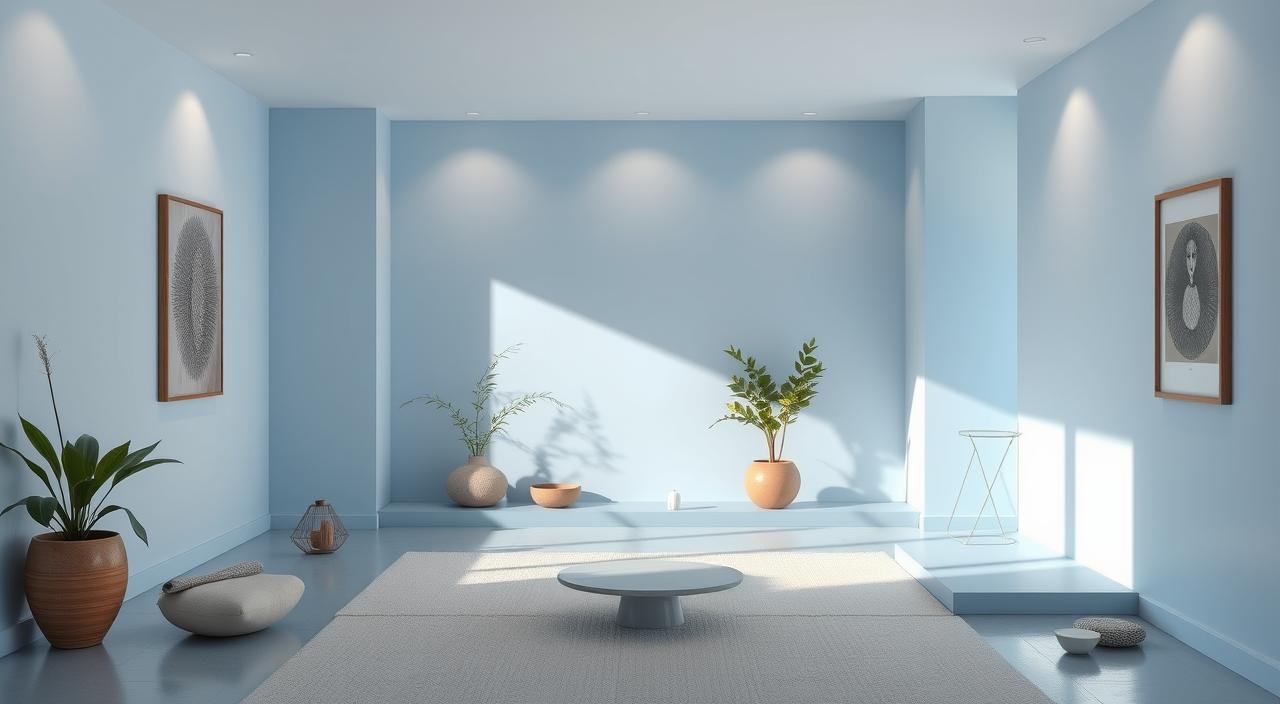
The feng shui blue color is key in the Family and Knowledge areas of the bagua map. Using blue here can bring growth, nurturing, and wisdom. It makes a space harmonious and enriching.
“Blue is the color of knowledge and family in feng shui, making it a powerful choice for cultivating both intellectual and relational growth within a space.”
Choosing a mid-tone blue or a midnight hue can change your home’s energy. Understanding blue’s meaning in feng shui can transform your space. It nourishes the mind, body, and spirit.
The Renewing Power of Green
In feng shui, green is a color full of renewal and fresh energy. It’s linked to the wood element and the Family area of the feng shui bagua map. Using different shades of green in your home can bring many positive effects.
Green can be added in many ways, like home decor or green houseplants. The green color brings growth, harmony, and energy. It’s perfect for areas where you want to feel nurturing and restorative.
“Green is the most abundant color in nature, representing growth, renewal, and the promise of new beginnings. Incorporate this vibrant hue into your home to harness its renewing power and foster a sense of balance and rejuvenation.”
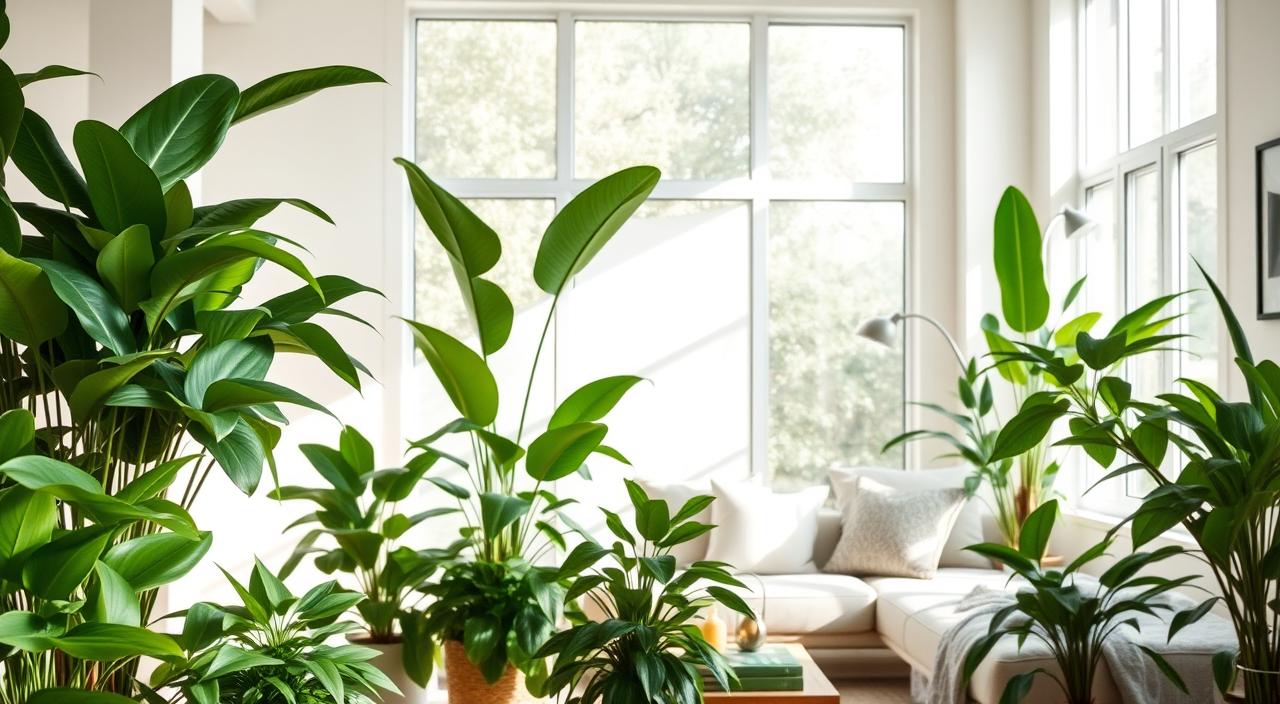
Choosing green for a bold piece or small accents can change your home’s energy. By using feng shui green color, you can make a space that boosts your well-being and brings harmony.
The Auspicious Energy of Red
In feng shui, red is seen as the most powerful and auspicious color. It represents the fire element and is linked to the Fame area of the feng shui bagua map. This area is about visibility, inspiration, and clarity. Red is used to protect and energize a home’s feng shui.
Red’s influence goes beyond looks. In Black Sect Feng Shui, red envelopes honor and protect feng shui consultants and their clients. This act uses red’s power to clear and revitalize a space’s energy.
The Fire Element and Fame
Red’s vibrant energy can be exciting but should be used wisely. It’s best not to use it in relaxing spaces like bedrooms. Feng shui experts suggest adding red accents like sheets or pillows to boost passion and inspiration in relationships. Red artwork or decor near a desk can also bring fame and recognition to your career.
For a balanced feng shui in your home, getting advice from a professional is wise. They can guide you on using red feng shui and color to improve your life.
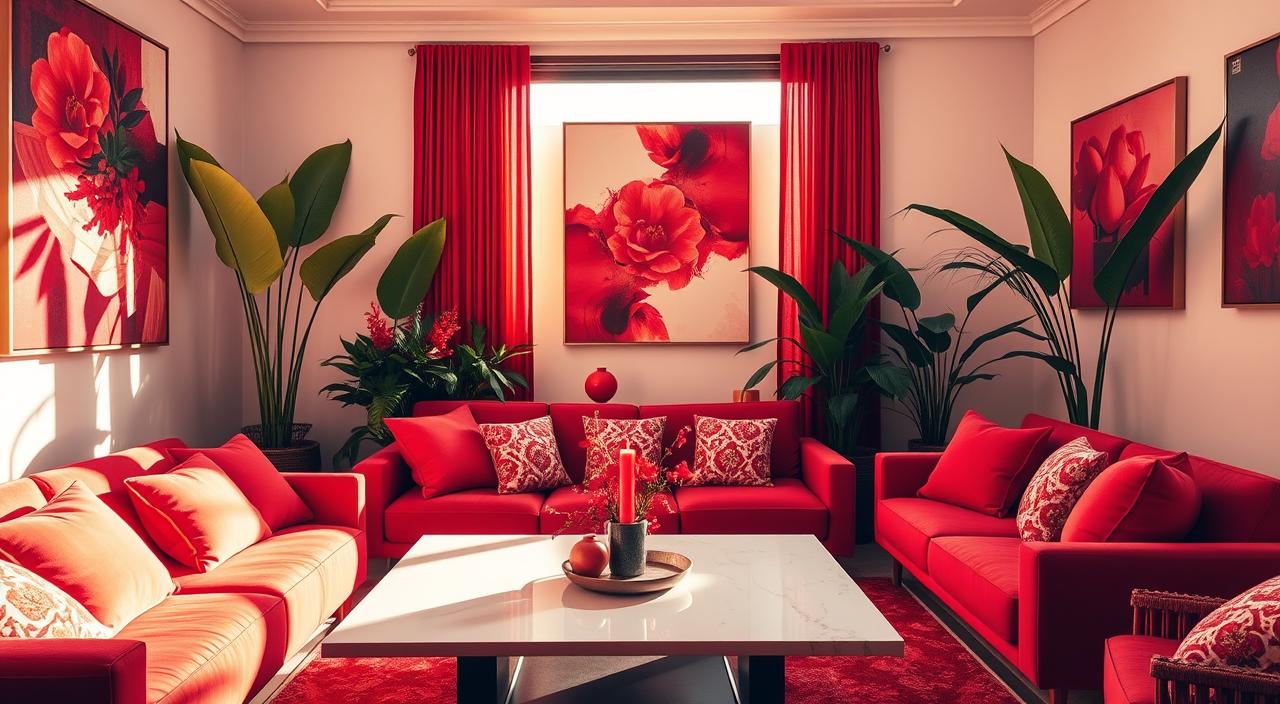
“Red is the color of passion, fire, and fame. It’s the ultimate symbol of energy and power in feng shui.”
Earthy Tones and the Earth Element
In feng shui, the earth element is all about grounding and stability. Colors like browns, yellows, and oranges capture this essence. They bring warmth and a connection to nature into our homes.
Brown, found in wood floors or furniture, is great for adding earth element vibes. It makes a space feel cozy and stable, perfect for relaxation.
Yellow can symbolize the sun’s warmth or the earth’s nurturing side. It ranges from bright sunflower colors to soft, buttery tones. This color adds positivity and growth to any room.
Orange blends red and yellow, making it versatile. It can bring energy while keeping a grounded feel. It’s all about balance in home decor.
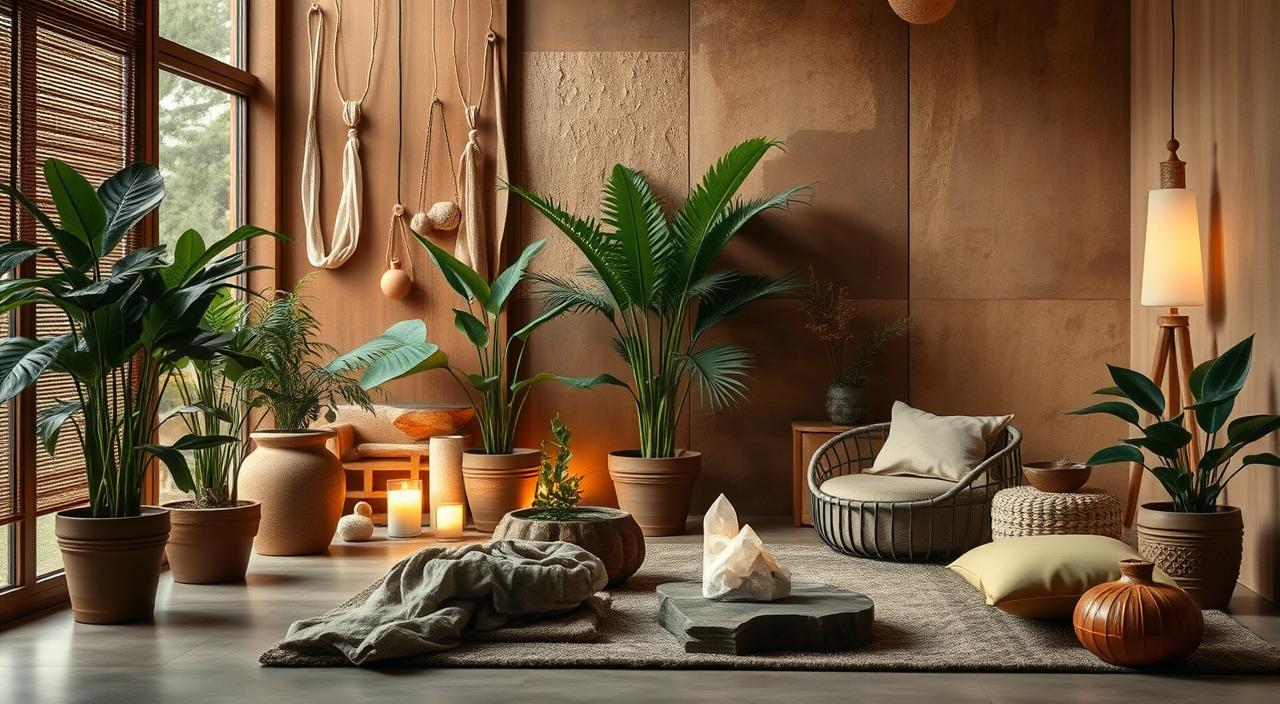
“The earth element is associated with grounding, stability, and self-care. Incorporating earthy tones into the home can help create a nurturing and inviting atmosphere.”
Using these earth element feng shui colors in your home can bring balance and harmony. It helps us feel more connected to nature.
Conclusion
Feng shui is an ancient Chinese art that focuses on balancing energy in spaces. It uses color in a strategic way. Knowing the feng shui color meanings and using the best colors for feng shui can greatly improve a space’s energy.
Colors like blues and greens can calm us, while reds and yellows can energize us. Choosing the right colors can change how we feel and work. By matching colors with the five elements and the feng shui bagua map, we can make spaces that support our goals.
“The right colors can bring about a sense of calm, clarity, and positivity, while the wrong choices can disrupt the energy flow and create imbalance.”
Feng shui experts suggest using a mix of yin and yang colors. They recommend natural, earthy tones. Soft pastels like pale blues and greens can make a space calm. Bright colors like red and orange can add energy.
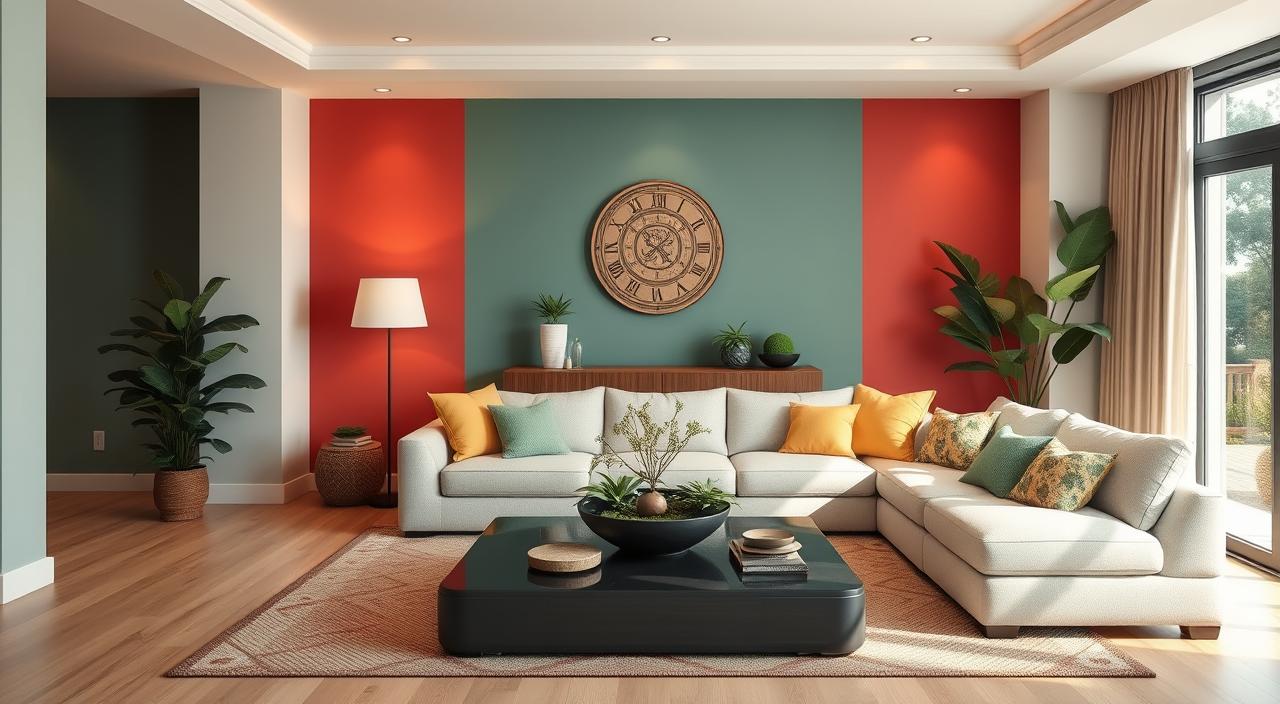
By knowing the feng shui color meanings and using them wisely, we can make spaces that are not just pretty but also good for our well-being. A calm bedroom, an energizing living room, or a nurturing kitchen can all be created with the right colors. This can truly change a space and improve our lives.
Conclusion
Learning about feng shui color meanings and the best colors can change how we live. It turns our homes into peaceful and balanced places. By using the five elements and the feng shui bagua map, we can make our homes support our goals and improve our health.
Choosing the right colors can greatly affect our home’s energy flow. Colors can help us sleep better, be more creative, and even attract wealth. The impact of feng shui colors is huge.
Knowing the meaning behind each color lets us create homes that show our style and bring balance. By using feng shui color meanings and best colors for feng shui, we can change our homes and our lives for the better.
Enhance Your Life with Feng Shui Jewelry
Bring balance and positive energy into your life with Feng Shui Jewelry. Our carefully crafted pieces are designed to enhance your well-being and attract harmony. Want to experience the benefits for yourself? Click here to explore our collection and find your perfect piece.
FAQ
What is the significance of color in feng shui?
Color is key in feng shui to change a space’s energy. It affects our feelings and well-being. Different colors, like those from the five elements, bring unique energies. Knowing these colors helps make homes more harmonious and life’s energy flow better.
What are the five elements and their associated colors in feng shui?
The five elements – wood, fire, earth, metal, and water – each have colors. These colors are important for applying feng shui in the home.
What is the meaning of white in feng shui?
White is linked to the metal element in feng shui. It stands for mental clarity, productivity, and completion. White is like a blank slate, representing the yang side of yin-yang. It helps create harmony and balance when used with other colors.
What is the meaning of black in feng shui?
Black is the sum of all colors in feng shui. It’s the yin side of yin-yang. It’s connected to the water element, which means quiet, wisdom, and contemplation. Black has positive meanings in feng shui, like depth and personal exploration.
How is gray used in feng shui?
Gray is a mix of black and white in feng shui. It stands for clarity, connection, and wisdom. Gray is neutral and works well in most homes. It can be used in different shades to enhance various areas.
What is the significance of blue in feng shui?
Blue’s meaning in feng shui depends on its shade. Mid-tone blues and teals are linked to growth and vitality. Deep blues are connected to water and wisdom. Blue is also important in the Family and Knowledge areas of the bagua map.
How does green contribute to feng shui?
Green is about renewal and fresh energy in feng shui. It’s the color of the wood element and is linked to the Family area. Using different shades of green can enhance the energy in a home.
What is the significance of red in feng shui?
Red is the most powerful color in feng shui. It’s the color of fire and is connected to Fame. Red is used to protect and clear a home’s energy. It’s also used in red envelopes to honor and protect consultants and clients.
How do earthy tones contribute to feng shui?
Earthy tones like browns, yellows, and oranges bring the Earth element into homes. This element is about grounding, stability, and self-care. Brown wood floors or furniture can add warmth and connection to nature. Yellow can represent sunlight’s energy or the earth’s nurturing qualities. Orange combines red and yellow, needing balance in home decor.












